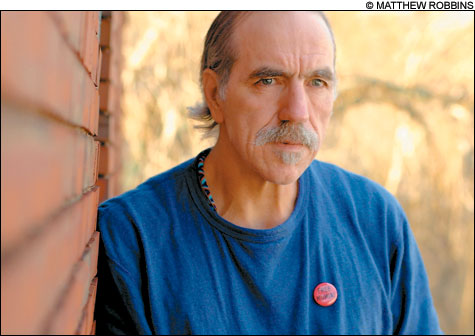
LONG LINE: UMass's botched handling of a scheduled campus appearance by convicted domestic terrorist Ray Luc Levasseur was just the most recent in a string of university assaults on the First Amendment. |
If free speech is what gives value to the campus "marketplace of ideas," UMass Amherst would long ago have gone bankrupt.
Last week's bizarre back-and-forth regarding former militant activist Ray Luc Levasseur's speaking appearance was just the latest First Amendment dustup on the western Massachusetts campus. The school's fifth annual Colloquium on Social Change, which specifically addressed the 20th anniversary of Levasseur's historic sedition trial, was to have featured Levasseur, members of the jury who acquitted him, and academics. The event went ahead last Thursday, but with one notable absence: Levasseur. (His ex-wife, Pat, also a '70s activist, spoke in his stead.)
No matter the last-minute lineup change; it was perhaps inevitable that the events preceding the lecture would end up overshadowing it. Levasseur's invitation, extended months in advance by the UMass Amherst Libraries, was withdrawn by the library group on November 5 — after Governor Deval Patrick's office told school officials that reneging on the invite "was the right thing to do." Four days later, a group of faculty re-invited the controversial speaker in the name of academic freedom. Administrators squirmed, but recognized that, because UMass is a public university — and hence covered by both the federal First Amendment and its even more potent state constitutional free-speech protection — they would not be able to block an already-issued faculty invitation.
Then, the day before the event, the US Parole Commission, in an unusual move surely aimed at keeping Levasseur from showing up, ordered the parolee not to leave his home state of Maine. The show would go on, without the main attraction.
In the end, it was outside powers that barred Levasseur from campus. But the expressed philosophy and initial actions by UMass administrators who sought to censor the divisive speaker remain perhaps the most shameful display of campus cowardice in recent memory.
To be sure, UMass is not alone in backing down amid controversy. Similar rescinded invitations were witnessed earlier this year at Boston College, with former militant activist William Ayers, and Clark University, with controversial Holocaust scholar Norman Finkelstein. But those Bay State institutions are private; though they are morally and ethically bound to respect academic freedom, the argument that they are legally required to do so, based on state contract law, is much weaker.
UMass, meanwhile, is subject to the state and federal free-speech guarantees. As a public university, it cannot censor a speaker unless he or she incites imminent lawless action. Nonetheless, in the Levasseur incident, virtually everyone involved — UMass administrators, the president, and even the faculty — displayed political hypocrisy at best, and a profound lack of understanding of the virtues and ideals of free speech at worst.
Political opportunism
First, though, there was the governor. Patrick essentially pressured the state's flagship public university to violate the First Amendment and censor the invited speaker. Patrick himself was reportedly under pressure from local and national police associations, which claim that the group that Levasseur co-founded — a now-defunct Marxist organization called the United Freedom Front, which authorities say carried out 20 bombings and nine bank robberies — was responsible for the 1981 shooting death of New Jersey state trooper Philip Lamonaco. (Lamonaco's widow, Donna, was there on Thursday protesting the forum, along with 100 others.)